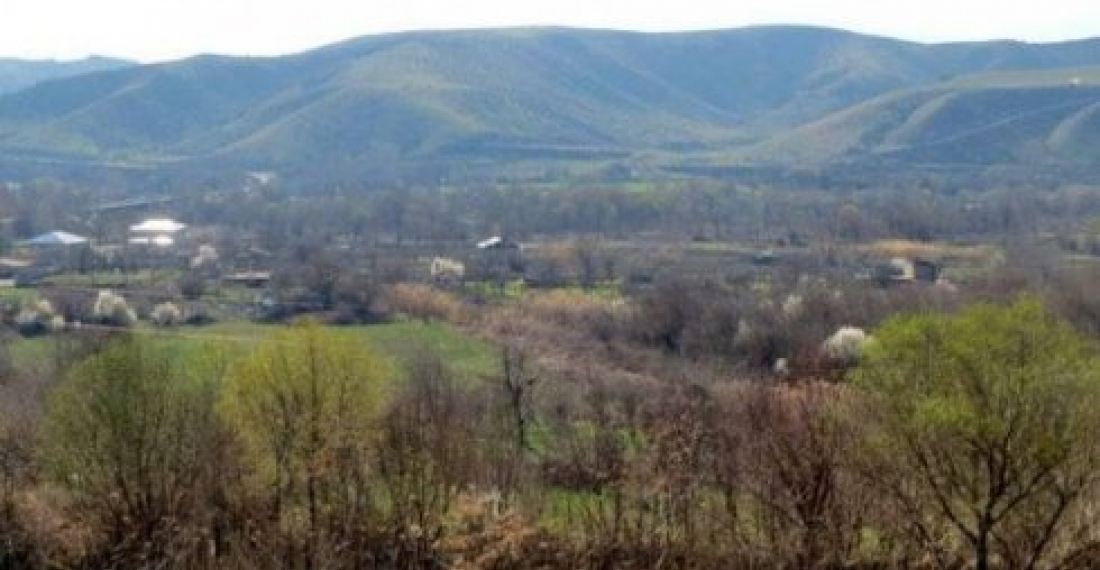A small village close to Azerbaijan's border with Iran has recently assumed huge symbolic importance for the Azerbaijani government and public. Since 1993 Jojuk Marjanli in the Jabraili district, has been uninhabited after it was occupied by Armenian forces in the Karabakh conflict. It lay close to the line of contact under the watchful eye of Armenian forces who dominated over it from a hill called Lale tape, which lies 2.9 kilometers north west of the village. It was not safe for the villagers to stay there, although one family reportedly did. In April 2016, during intensive fighting in the Karabakh conflict zone, Azerbaijan managed to regain control over Lale tape hill, and it finally became safe for the residents of Jojuk Marjanli to return home.
The Azerbaijan government has just announced ambitious plans to rehabilitate Jojuk Marjanli. Under a presidential order, dated 24 January, 4 million manats ($2.12 million) was allocated from the President's 2017 Contingency Fund to the State Committee for Refugees and IDPs for the construction of 50 houses, a school building and relevant infrastructure in the village.
 For Azerbaijan, the story of Jojug Marjanli represents the start of the realisation of a passionate wish to return to the lands that it lost as a result of the Karabakh war in the period 1989-94. Many Azerbaijani politicians have hailed the rehabilitation of the village, voicing hope that it is the beginning of the "great return"..
For Azerbaijan, the story of Jojug Marjanli represents the start of the realisation of a passionate wish to return to the lands that it lost as a result of the Karabakh war in the period 1989-94. Many Azerbaijani politicians have hailed the rehabilitation of the village, voicing hope that it is the beginning of the "great return"..
"I regard it [the April battles] as a victory of the entire Azerbaijan nation and believe that all our territories will be liberated from occupation," said Ziyafat Asgarov, first vice-speaker of the Azerbaijani parliament, while commenting on the reconstruction of the village. "Ilham Aliyev's order on measures to restore the Jojug Marjanli village of the Jabrayil district is a historical step, a historical decision. This is the beginning of big events", said Deputy Prime Minister, and Executive Secretary of the ruling New Azerbaijan Party, Ali Ahmadov. "Azerbaijani state and government once again demonstrated their determination to liberate the occupied territories. By restoring our liberated lands, we deliver message of high spirit of the society to whole world, international organizations created for settlement of the Nagorno Karabakh conflict and Armenian side. The position of our society is that Azerbaijan will liberate its occupied lands by any means. Our internally displaced people will to return to their homes. Thus, the territorial integrity of Azerbaijan will be restored and a great historical injustice will be corrected."
Ahmadov noted that the government will carry out the work necessary in Jojug Marjanli. "However, I think as our occupied lands are liberated from occupation, international organizations will provide support and allocate grants to the restoration of those lands. However, this is the work of the future", he added. Azerbaijan intends to invite diplomats and representatives of international organisations to visit Jojug Marjanli soon.
But for the moment the Azerbaijan government can show Jojug Marjanli as a proof that the liberation of its lands by military means is possible, not least to justify in front of its own people the high expenditure on the military budget in recent years.
Many Armenian and Azerbaijani soldiers died in the battle for the Lale Tape Hill in April 2016. It is part of the price that the two countries are paying for failing to resolve the conflict peacefully. Many observers think that there will be more fighting this year, if the negotiations do not gather momentum. More young people will die, fighting for empty villages and strategic heights. The joyous event of the return of displaced people to their homes is therefore tempered by the prospect that it may trigger further violence if politicians on both sides don't rise to their responsibility, and renew with vigour their efforts to resolve the conflict peacefully.
This analysis was prepared by the staff of commonspace.eu
A decrepit village sign for Jojuk Marjanli (picture courtesy of haqqin.az)







